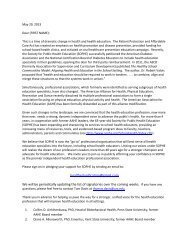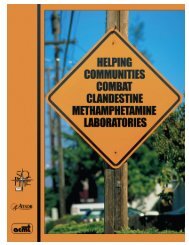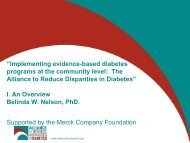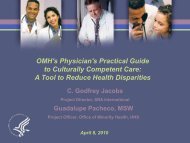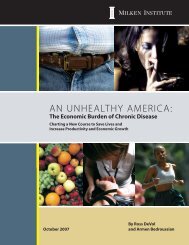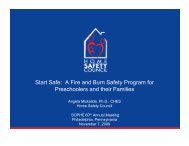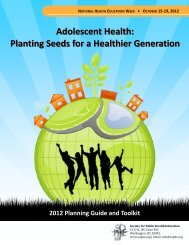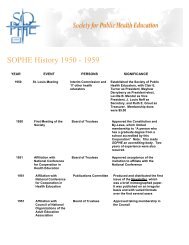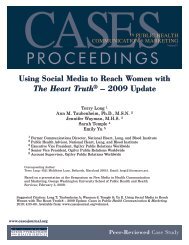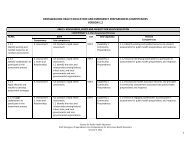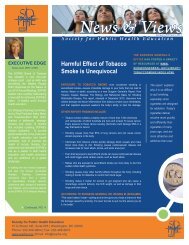healthy people 2020 - Society for Public Health Education
healthy people 2020 - Society for Public Health Education
healthy people 2020 - Society for Public Health Education
Create successful ePaper yourself
Turn your PDF publications into a flip-book with our unique Google optimized e-Paper software.
✯ Conference Abstracts ✯<br />
saturday | november 6<br />
84% Caucasian, and 5% were Hispanic; 22% had less than a high school<br />
diploma, 36% had a high school diploma and 41% had some college or<br />
greater. 15% of the population had inadequate health literacy as measured<br />
by the DAHL. Those with inadequate health literacy were significantly<br />
more likely to have poor or fair overall health (OR=2.04; CI: 1.97-2.19),<br />
diabetes (OR=1.09; CI: 1.02-1.16); mental distress (OR=1.38; CI: 1.15-<br />
1.64), need more assistance with ADL (OR=2.45; CI: 2.30-2.59), and have<br />
difficulties with IADL (OR=2.32; CI: 2.18-2.47). Conclusions: Inadequate<br />
health literacy as measured by the DAHL was found to be associated with<br />
poorer health outcomes in the nationally representative sample.<br />
implications <strong>for</strong> practice: To promote public health practice in<br />
older adult populations with inadequate health literacy we must incorporate<br />
HP<strong>2020</strong> health communication objectives. <strong>Health</strong> education aimed<br />
at improving health literacy in older populations may translate into<br />
better overall health and quality of life.<br />
Do Well, Be Well con Diabetes: A Pilot Study of a Type-2 Diabetes<br />
Self-management <strong>Education</strong> Program <strong>for</strong> Hispanic/Latino<br />
Rural Older Adults.<br />
Ninfa Purcell, PhD, CHES, Assistant Professor/<strong>Health</strong> Specialists,<br />
Family Development and Resource Management<br />
The purpose of this grant-funded pilot study was to test the effectiveness<br />
of the Do Well, Be Well con Diabetes (DWBW) program, a 6-week type<br />
2 diabetes self-management intervention. Low-literate, Spanish-speaking<br />
rural seniors (> 55 years) and their families were the intended audience.<br />
Efficacy of the program was based on Hemoglobin Alc (A1c) levels, a<br />
gold standard <strong>for</strong> blood glucose control. Two Texas counties, Starr and<br />
Hidalgo, were selected as pilot sites because these communities have<br />
the characteristics that can best be served by DWBW, including: high<br />
rates of diabetes, rural, medically underserved, a growing Hispanic elder<br />
population, and a larger proportion of Hispanic/Latinos. A prospective,<br />
quasi-experimental, repeated-measure design was employed to test the<br />
program’s effectiveness. Intervention and wait-list (control) sites were<br />
Starr and Hidalgo Counties, respectively. At baseline and three months,<br />
HbA1c, self-efficacy, acculturation, diabetes self-care behaviors, and diabetes<br />
knowledge were assessed. The diabetes knowledge scale, consisting of<br />
open-ended items, will not be reported in this preliminary study. Frequency<br />
counts show that <strong>for</strong> the intervention county the mean age was 58.6 years<br />
(N = 50) with 70% females. Almost half (47%) of the Starr County participants<br />
had never been to high school, 30% had been to high school but left<br />
be<strong>for</strong>e graduating. The remaining 20% had a high school diploma. Half of<br />
the participants (50%) spoke and read Spanish only. Another 30% spoke and<br />
read Spanish and English equally well. Mean pre hemoglobin A1c (A1c) was<br />
8.34 (1.86 SD). The lowest A1c was 4.6 and the highest was 13.3. According<br />
to the American Diabetes Association, an A1c 7 or below is considered ideal<br />
<strong>for</strong> glycemic control. Positive changes were found on every measure of selfefficacy.<br />
Overall, participants averaged a 3 point gain in self-confidence (pre<br />
score 5.66; post score 8.65). Participants reported increase self-confidence<br />
regarding exercise and diet. When examining self-care behaviors, blood sugar<br />
was tested more often and feet and shoes were checked more often. Preliminary<br />
evidence from this pilot study suggests that participants completing<br />
DWBW show improvements in self-care behaviors and self-efficacy. It can<br />
be concluded that these favorable results demonstrate participants’ ability to<br />
maintain glucose control, thus reducing their risk <strong>for</strong> complications.<br />
saturday | november 6<br />
The Impact of <strong>Health</strong> Beliefs and Demographic Characteristics<br />
on Breast Cancer Screening Practices among Women<br />
Age 55 and Older.<br />
Peggy Johnson, MPH, Texas State University<br />
background: One of every eight women in the United States will be<br />
diagnosed with breast cancer in her lifetime. Although early detection<br />
of breast cancer is the most effective method of assuring survival, many<br />
women throughout the country do not avail themselves of this advantage.<br />
Hypotheses that explain breast cancer mammography screening<br />
practices by older women can be classified as health beliefs and socioeconomic/structural<br />
issues.<br />
purpose: This study assessed whether individual health beliefs as well<br />
as demographic factors were associated with obtaining recent and regular<br />
mammography screening. In addition to health beliefs, demographic<br />
data including age, educational attainment, or rural versus urban/suburban<br />
residence were examined.<br />
methods: Data was collected from four hundred women from 31 counties<br />
in Tennessee using the Champion Revised <strong>Health</strong> Belief Model Scale.<br />
The sample <strong>for</strong> analysis included women age 55 and older from rural,<br />
urban and suburban areas within these counties. Results: Individual health<br />
beliefs and demographic characteristics were associated with a higher<br />
likelihood of having a recent and regular mammography screening.<br />
conclusions: An association of health beliefs concerning the benefits<br />
and barriers of mammography screening to regular and recent mammography<br />
screening was found in this study. Additional associations<br />
to demographic characteristics were also found. Theoretical models are<br />
needed to explain the association between health beliefs and demographic<br />
characteristics to mammography screening practices.<br />
concurrent sessions d3<br />
Room: Colorado E-F<br />
scaling new heights in health education leadership:<br />
revisiting our past to in<strong>for</strong>m our future<br />
Scaling New Heights in <strong>Health</strong> <strong>Education</strong> Leadership:<br />
Using Our Past to In<strong>for</strong>m Our Future<br />
John P. Allegrante, PhD, Professor and Deputy Provost, Teachers College,<br />
Columbia University; Emily Tyler, MPH, CHES, Greesboro, NC <strong>for</strong> Harriet<br />
Hylton Barr; David A. Sleet, PhD, Centers <strong>for</strong> Disease Control and Prevention,<br />
Atlanta, GA, <strong>for</strong> Martin Fishbein; David S. Sobel, MD, MPH, Kaiser<br />
Permanente Northern Cali<strong>for</strong>nia, Oakland, CA, <strong>for</strong> Laura Keranen<br />
The modern history of health education includes a pantheon of individuals<br />
whose legacies of leadership have shaped both SOPHE and the<br />
profession. Among the generation of those who played key roles in<br />
health education during the last half of the 20th century and gave life to<br />
the early phase of SOPHE’s development were Laura Keranen, Harriet<br />
Hylton Barr, Norbert Reinstein, and Martin Fishbein. This session will<br />
bring together a distinguished group of contemporary leaders in health<br />
education that will assess the life and work of these important figures in<br />
the history of school and public health education and discuss the implications<br />
of the legacy each leaves <strong>for</strong> addressing the challenges of today’s<br />
health problems.<br />
sophe conference ✯ november 4-6, 2010 35




